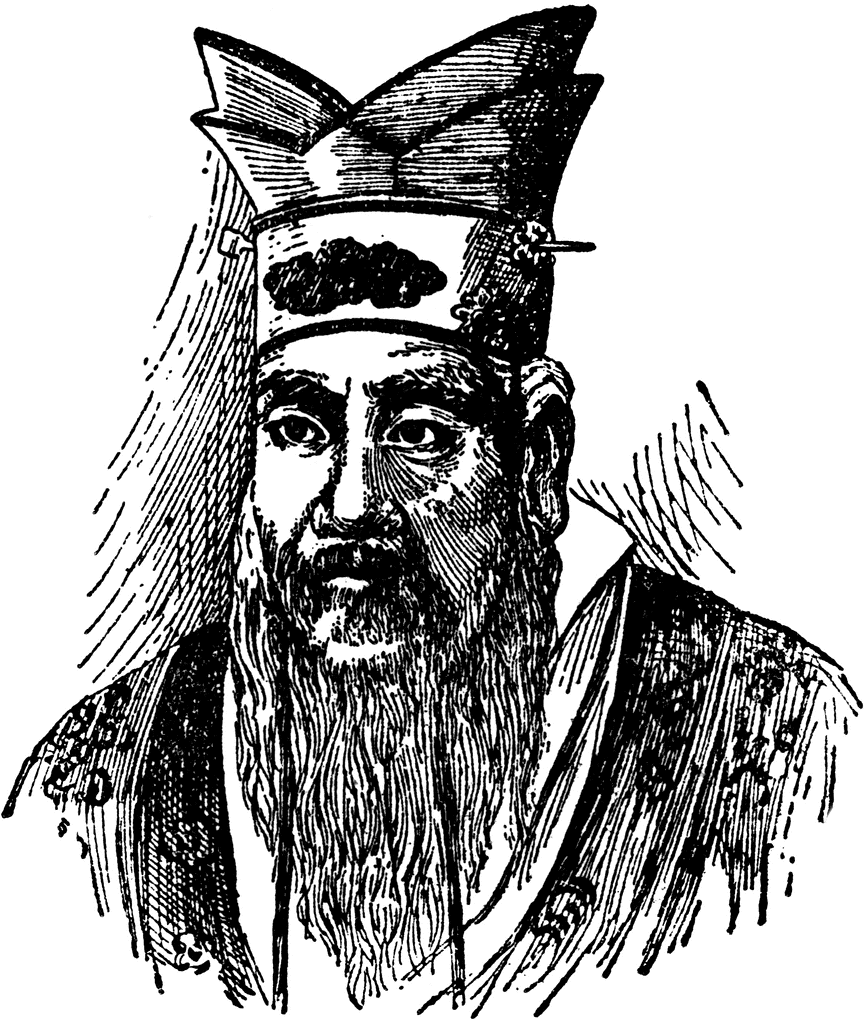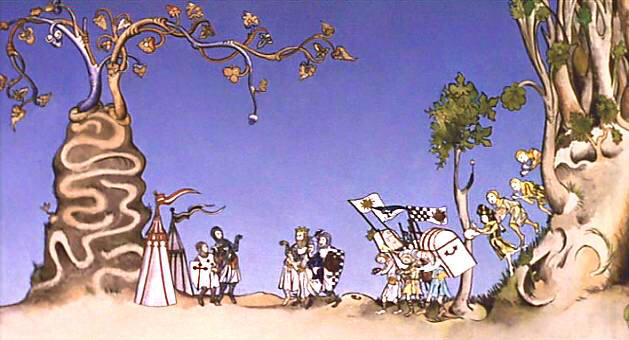
庄子见鲁哀公。哀公曰:‘鲁多儒士,少为先生方者’。庄子曰:‘鲁少儒。’哀公曰:‘举鲁国而儒服,何谓少乎?’
庄子曰:‘周闻之,儒者冠圜冠者,知天时;履句屦者,知地形;缓佩玦者,事至而断。君子有其道者,未必为其服也;为其服者,未必知其道也。公固以为不然,何不号于国中曰:“无此道而为此服者,其罪死!” ’
于是哀公号之五日,而鲁国无敢儒服者,独有一丈夫儒服而立乎公门。公即召而问以国事,千转万变而不穷。庄子曰:‘以鲁国而儒者一人耳,可谓多乎?’
Translation:
Zhuangzi visited Duke Ai of Lu. Duke Ai said: ‘In Lu there are many Confucians, but few of your own followers, sir.’ Zhuangzi replied: ‘Lu has few Confucians.’ Duke Ai said: ‘All over the state of Lu people wear Confucian clothes; how can you say they are few?’
Zhuangzi said: ‘I have heard that Confucians wear round hats to show they know the seasons of heaven; they wear square sandals to show they understand the earth; they hang crescent-shaped jade discs from their belts to show that they can make firm decisions. A gentleman who has found the Way may not wear such clothes, and someone who does wear such clothes may not have found the Way. Because your Grace does not believe this is the case, why not have it proclaimed in your state that: “All who have not found the Way but wear these clothes shall be put to death”?’
Within five days after Duke Ai proclaimed this, no one in the state of Lu dared wear Confucian clothing, except one man who wore Confucian clothes and stood at the Duke’s gate. The Duke summoned him and asked him about state affairs, and though they talked of many things, he did not waver. Zhuangzi remarked: ‘In Lu there is only one Confucian, how can you say there are many?’
From 《庄子专田子方》 Zhuangzi, Tianzi Fang; manga version below courtesy Larry Gonick’s Cartoon History of the Universe, Volume II

What was the point of this story, one might ask? Well, people certainly do put on clothes and act in a way which is not suitable to them, which is rather the point. I do not pretend to be a Confucian but rather hold to the High Church rites of the Anglican Communion, even though Confucius and Mencius both have made profound impacts on my own philosophy and theology. Yet even today, there are those who go about in Confucian clothing but do not understand the Confucian way, and who would be put to the executioner’s sword in the state of Lu.
I daresay that reading Confucius and Mencius, we can understand how they both were wont to think. They valued honesty and virtuous comportment in government. They were for humane expression in both one’s personal and one’s political life. They believed in proper, caring, proportionate relationships between people and excoriated those who abused their relationships. They believed in peace, but also recognised that peace was not possible without a just and harmonious social order, characterised by a respect for holistic dignity of persons rather than property rights (as evidenced by Confucius’ asking in the
Lunyu after the servants when the barn caught fire, rather than after the horses). They sought to reunite the warring states under just such a humane order. They believed that the acts of the just were guided by Heaven – but they were for mercy and leniency in the execution of the laws. There is one elegant English-language quote that captures the Way of Confucianism rather better than any other I’ve heard, and it goes like this:
‘With malice toward none, with charity for all, with firmness in the right as God gives us to see the right, let us strive on to finish the work we are in, to bind up the nation's wounds, to care for him who shall have borne the battle and for his widow and his orphan, to do all which may achieve and cherish a just and lasting peace among ourselves and with all nations.’
These words were spoken by one of the most famous, and simultaneously one of the most misunderstood and unfairly maligned, presidents in American history. I am referring, of course, to one Mr Abraham Lincoln, from whose second inaugural address these words come. I admit to being more than slightly defensive of the historical honour of Mr Lincoln, as a Tory radical and as a fervent opponent of slavery, racism and exploitation of the lower classes.
The Confucians, valuing honesty and the scholarly virtues, were naturally very careful historians (particularly
Ban Gu and his sister
Ban Zhao), and though their history was always viewed through a lens they were not particularly friendly to revisionism. I have recently noted the way in which libertarians have
misread Confucian philosophy for their own purposes. The petty and partizan revisionist view of Mr Lincoln, of which
this particular author, of the same crowd (and axe-bait for Duke Ai of Lu if anything can be) is a notably rabid proponent – which, in the most unhinged and immoderate terms, claims he is a tyrant, a war criminal and a usurper of power, which claims that his only end was to seek power and that he was a hypocrite over the issue of slavery, which claims that the Union over which he presided
attacked the seceding states and which claims that he paid no heed to the civil rights of the people of the North – should rightly be treated with scorn and ridicule.
The truth of the matter is that Southerners
pre-emptively attacked Fort Sumter under an imagined provocation, which was and had been the rightful territory of the United States government when its commission was made. It should, if we are being technically accurate in our history and in our rectification of names, be considered a
war of Southern aggression.
The very quotes which such petty people and partizans use to scorn Lincoln as a hypocrite actually show a highly complex, intelligent human being of likewise complex morals whose first priority was
social harmony in the state he governed, a Confucian goal if there ever was one. And, as GK Chesterton was careful to point out, if Lincoln was fully in the right about any one thing, it was that America, if it was to survive at all, was
one nation and not two – just as he recognised the ultimate futility of the barbarous institution of chattel slavery having any place in a harmonious nation. When the opportunity presented itself in late December of 1863, Lincoln made his feelings known on the subject unambiguously by calling for a Constitutional amendment that would end slavery. As for his being a tyrant and a usurper of power, the record stands that he was
fairly and democratically elected. Twice. Even in a nation which was embroiled in a war for its very survival, Mr Lincoln never lost sight of the fact that he was answerable before Heaven and before the people. In his second inaugural address, he by extension made himself answerable to the people of the defeated South, offering leniency and mercy instead of retribution and harsh punishment. Unfortunately, he was treacherously assassinated before he could fully put these words fully into practice, and his successors were not keen to honour the work Mr Lincoln had begun.
As for the impingements on civil rights: yes, Mr Lincoln did suspend
habeas corpus in 1861. And then he willingly, on his own accord, restored it in 1862. It is not, as a rule, a defining mark of tyrants that they willingly relinquish powers they have given themselves. However, after a second imposition later that year, Congress then took it upon itself to suspend
habeas corpus by law in 1863; Lincoln did not, naturally, veto this bill, but neither did he exercise it to its full extent. Compare and contrast this with the actions of one Mr Jefferson Davis, who not only suspended
habeas corpus indefinitely but also declared martial law throughout his stolen half of the states, and who ended up having to put down counter-secession movements in several states using brutal military force.
Let me be clear: I am not partial either to modernism or to Americanism, and I abhor the way in which Northern industrial and financial interests ultimately gained control through the consolidation of power in the federal government which followed (but such was hardly Mr Lincoln’s purpose, nor was it his doing alone; indeed, the lion’s share of the blame belongs to Taft). But I do also have several clear and distinct Catholic convictions (I use the term broadly) – among them: that God looks upon faith and makes no distinctions based on race, gender or economic status; also among them: that the Triune God is a social God wishes people to live in harmony with one another. Dr Samuel Johnson was clear that chattel slavery as practiced in the Americas was an
innovation of colonial conquest, a great destroyer of both virtue and harmony in personal relationships, not just for the slave but also for the master; and a cultural and social order that was devoted primarily to the cause of not only defending, but spreading slavery to its neighbours (the American West,
Cuba, Mexico and Brazil) either by political pressure or by imperial conquest, was doomed to failure from its outset.
As a Tory radical in the tradition of Dr Samuel Johnson, Richard Oastler and Bp Beilby Porteus, I cannot help but look at the massive, industrialised factory farms and dehumanising conditions under which the majority of slaves in the antebellum South worked with
contempt and revulsion, and at the hypocrisy of the false gentlemen (I borrow the expression from the Chinese
weijunzi ‘伪君子’) in revolt, who claimed to be acting in the best interests of their country (the more so because they put on a tremendous pretence of being in continuity with tradition – and yet the cotton industry, so dependent upon European markets and expendable uprooted human beings with no legal standing, was thoroughly capitalist and globalist in the worst of all possible ways). Interestingly, such revulsion was common amongst other contemporary Tories as well. The stridently traditionalist Pope Gregory XVI issued the bull
In Supremo Apostolatus condemning slavery and the slave trade in general, but
in context specifically against the institutionalised enslavement of black people in America, an evil which the Confederacy was established to propagate and perpetuate and which Mr Lincoln sought to limit and to end. (Unfortunately, his pious but muddleheaded and legalistic successor lacked Pope Gregory’s profundity and keen insight on social issues and foreign affairs.)
Thankfully, there has been one person, who (though I have reservations about the particular and uncompromising brand of republicanism he championed) by rights may be considered an
actual Confucian (even if he didn’t wear the Confucian garb), and who had a proper appreciation for the contributions of Mr Lincoln. Sun Wen’s Three Principles of the People, on which much of subsequent Chinese political philosophy (good and bad) has been based, paid homage to Mr Lincoln’s borrowed phrase in the Gettysburg Address: ‘
government of the people, by the people and for the people’.
Well, end of this defiant Tory radical’s latest rant. Back to normal reflections on life in China soon, I promise.























